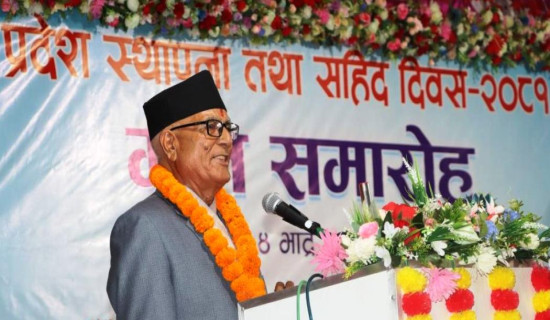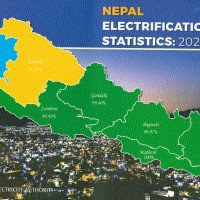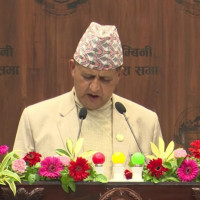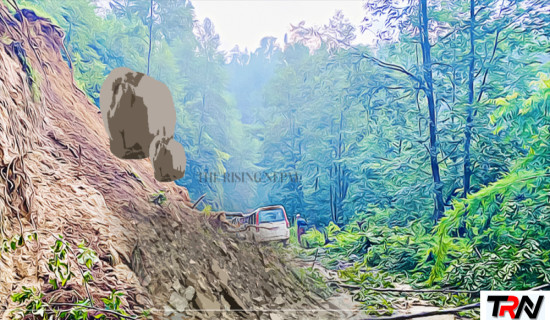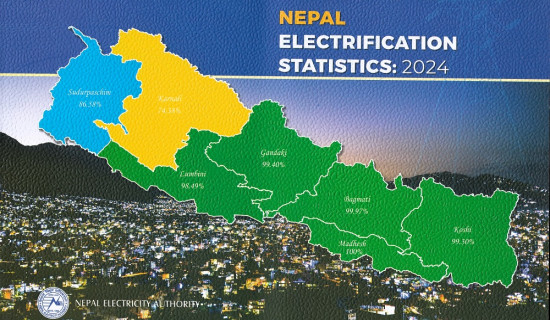- Tuesday, 20 August 2024
'Low revenue, soaring public debt creates problem in mobilizing development finance'
Kathmandu, Aug 20: Deputy Prime Minister and Finance Minister, Bishnu Prasad Paudel, has said it is challenging to manage resources for development in the face of the weakening capacity of the developing and least developed countries in mobilizing the internal revenues.
Addressing the programme titled 'Finance for Development Dialogue' organized by the United Nations in partnership with the Ministry of Finance and the Federation of Nepalese Chambers of Commerce and Industry (FNCCI) here today, he said Nepal is also facing problem created due to the low revenue collection and the growing public debt obligations.
"It is seen that the government's investment in development activities is going to shrink due to the compulsion of investing a major portion of the revenue in paying the public debt. This has increased the risk of pushing far the aspiration of meeting the sustainable development goals," Finance Minister said.
The United Nations has been emphasizing on mobilizing capital for development in line with the slogan of 'nobody should be left behind in meeting SDGs'.
The Finance Minister pointed out that paucity of source for investment is the main challenge for the developing and least developed countries. These countries are affected the most by the climate change impact, he added.
High trade deficit, slow economic growth and the diminishing trend of development assistance has created more problems for the developing and least developed nations, the Finance Minister said, calling for using new and alternative ways of development financing.
The Minister pointed out the need to prepare a draft of the development fiscal with maximum utilisation of all potential resources including internal resources, private capital, and development assistance.
Despite a better picture of the revenue ratio in comparison to the Gross Domestic Product, its sustainability is to be ensured.
The capital flow from the direct foreign investment and external sector is relatively less. Challenges are ahead likely in the public debt. High trade deficit low economic growth rate and long-standing structural issues remain current challenges for the economy, according to the Finance Minister.
He said, "Nepal is marred by direct impacts of climate change. Though we have almost no contribution to carbon emissions, we suffer its consequences disproportionately, forcing us to allocate a significant budget for climate change adaptation. So, Nepal wants to secure new resources and instruments for development finance."
He said the government is committed to holding broader discussions about these issues with development partners and moving ahead accordingly.
As the Finance Minister said, the government wants to see a leading role of the private sector in the development of the economy. "The 16th periodic plan has highly prioritised the significance of the private sector in the development. It has recognized the private sector as its development partner. Our goals are not different. The government is committed to enabling atmosphere for promoting the investment from the private sector," he said, underlining the need to secure investment by preparing a draft of the development finance capable of attracting private capital and listing result-oriented projects.
He mentioned that the government was effortful to create employment opportunities in the country.
Finance Minister Paudel expressed the belief that employment opportunities could be increased in the country if government and private investment could be increased, adding the government would facilitate to bring in foreign investment not only internal investment.
"Internal capital and technology are not sufficient in development initiatives of Nepal. The government is committed to bring in foreign capital and technology as well as to formulate all policy-level and legal infrastructures. Further activities will be carried out for legal reforms and policy-level clarity", he mentioned.
Sharing that a target has been set to graduate Nepal to developing country from least developed country by 2026 and transitional strategy has been developed for the same, the Finance Minister explained that the country is going to do 'Sovereign Credit Rating' soon to utilize the opportunities and attract further investment once the country is graduated to developing country.
He opined that policy-level efforts have been started to bring improvement in public financial management system.
Similarly, President of Federation of Nepalese Chambers of Commerce and Industries, Chandra Prasad Dhakal, shared that Nepal has low volume of foreign direct investment.
"Foreign Direct Investment is only 0.2 per cent of our gross domestic product. It is very low in the countries like Nepal. The country has failed to get foreign investment as per the target", he mentioned.
FNCCI President Dhakal said, "This situation has increased dependency on loan. Public debt has been doubled in the last nine years. Increasing dependency on loans will not be sustainable in the long term. It poses a huge risk in our economic stability."
The growing dependency on loan will added more challenges at a time when the country is in the process of graduating to developing country from least developed ones", he opined. (RSS)

.jpg)




